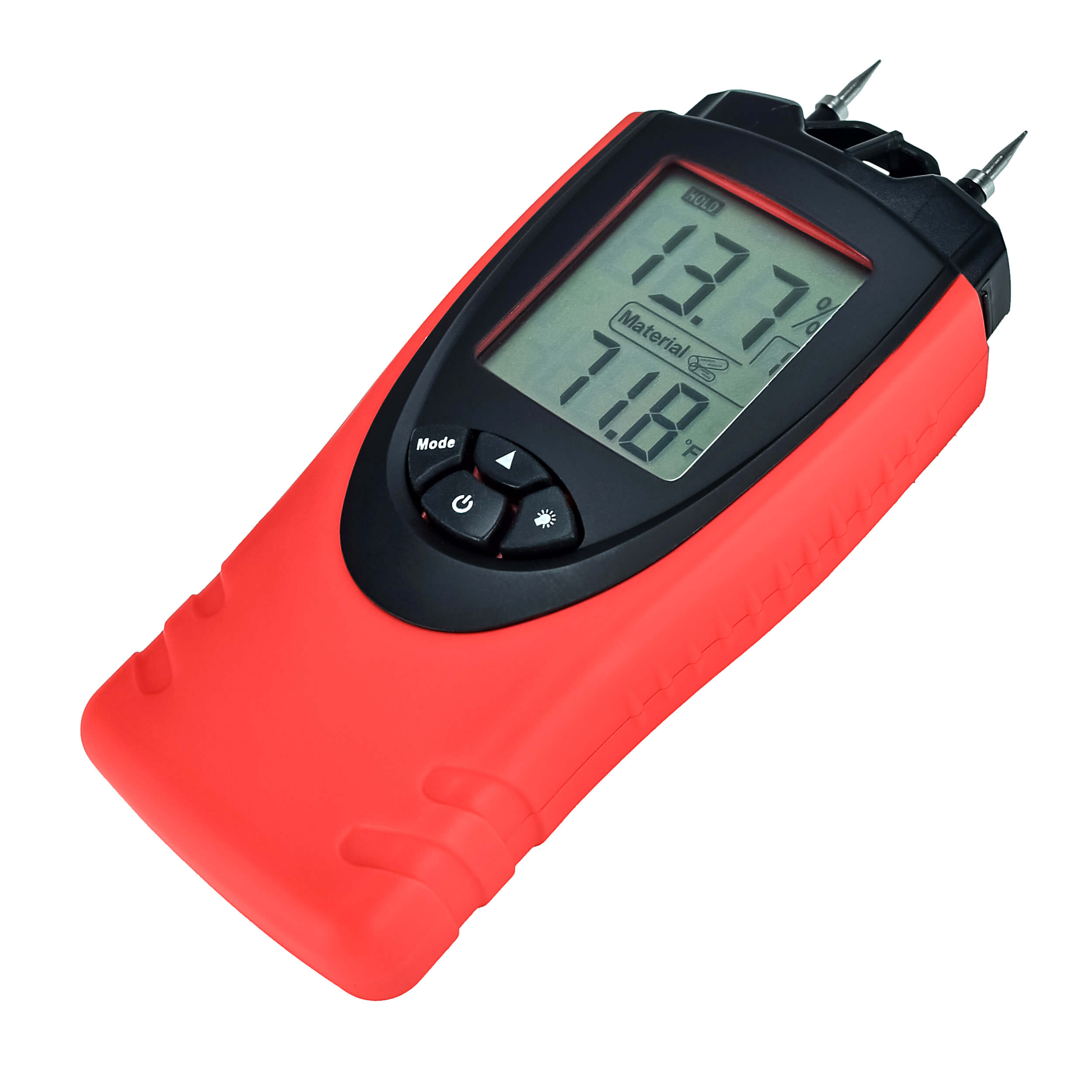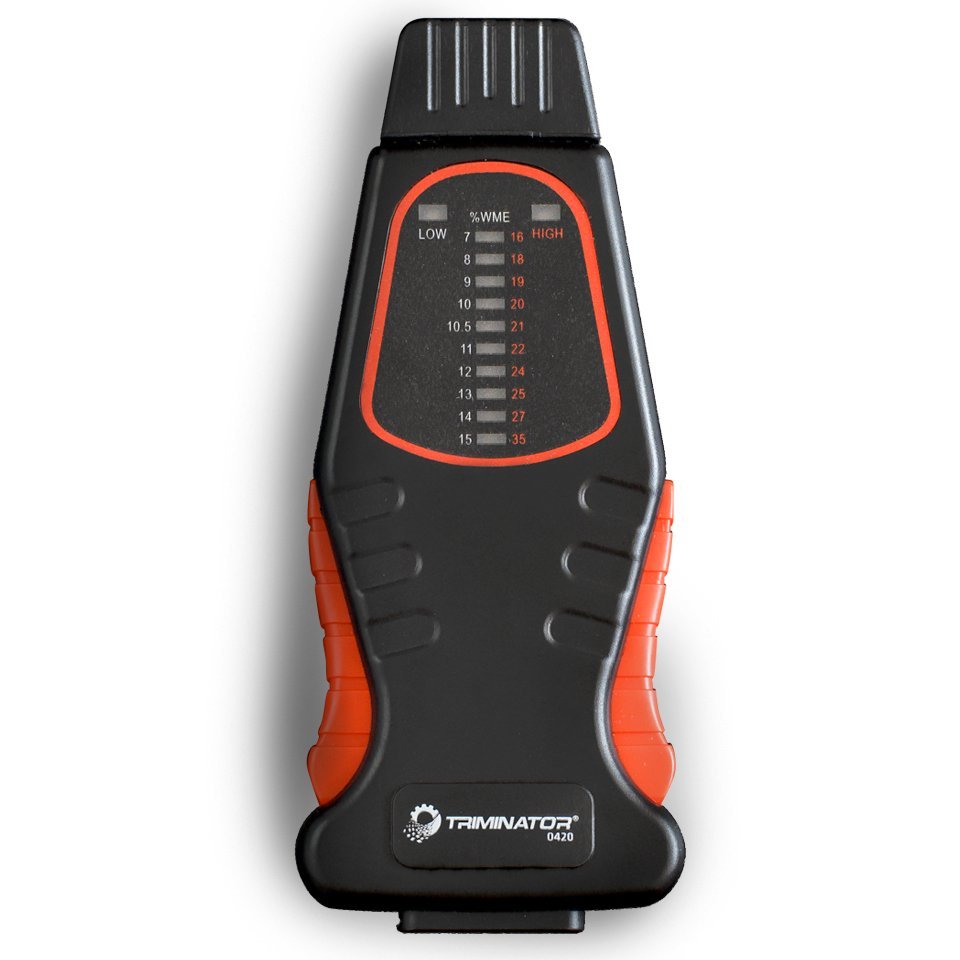The Ultimate Overview to Wetness Meters: A Comprehensive Overview and Just How They Can Save You Cash
Moisture meters serve as crucial tools in identifying and keeping an eye on moisture web content in products, aiding in stopping pricey problems and making certain the quality of products. Comprehending the subtleties of various kinds of dampness meters, their applications, and the potential cost-saving benefits they provide can be a game-changer for specialists and businesses alike.
Sorts Of Wetness Meters
Various sorts of moisture meters are available for different applications in different markets. One typical kind is the pin-type wetness meter, which gauges the electric resistance in between 2 pins placed right into a product. This kind appropriates for timber, drywall, and other building materials. Pinless wetness meters, on the other hand, use electromagnetic sensor plates to scan a larger area without causing damage to the material's surface area. Moisture Meter. These meters are ideal for rapidly evaluating wetness degrees in big locations such as wall surfaces and floorings.

In addition, there are likewise specialized moisture meters created for particular products like soil, grain, or hay. These meters offer accurate wetness readings customized to the unique buildings of the material being examined. Infrared moisture meters gauge the thermal residential or commercial properties of a material to establish its wetness material non-invasively, making them beneficial for applications where pin or pinless meters might not be suitable. Comprehending the various kinds of wetness meters offered can assist industries pick the most ideal tool for their details wetness dimension needs.

Advantages of Making Use Of Dampness Meters
Dampness meters use invaluable advantages in precisely evaluating and monitoring wetness degrees in varied products and environments (Moisture Meter). One of the primary benefits of utilizing moisture meters is the avoidance of possible damages triggered by excess wetness. By detecting and resolving high dampness levels beforehand, dampness meters help to avoid mold growth, rot, and architectural damages in buildings, saving both time and money on repair work. Furthermore, wetness meters help in making certain the top quality of products throughout construction or manufacturing processes. By properly measuring dampness content, these tools help maintain the honesty of wood, drywall, concrete, and other products, reducing the threat of flaws or failings.
Additionally, using wetness meters can lead to increased power effectiveness. In agricultural setups, moisture meters play an important role in maximizing crop returns by making it possible for farmers to monitor soil dampness degrees and make educated irrigation choices.
Exactly How to Select the Right Wetness Meter
Choosing the ideal wetness meter involves thinking about vital elements such as material compatibility, measurement variety, and calibration precision. When selecting a moisture meter, it's important to make sure that the meter is appropriate for the particular material you will certainly be screening. Various products have differing electrical residential properties that can influence moisture readings, so selecting a meter developed for your material is vital for exact outcomes. In addition, take into consideration the dimension range of the moisture meter. Guarantee that the meter can discover wetness degrees within the variety required for your applications. Calibration accuracy is one more vital element imp source to maintain in mind. Decide for a wetness meter with trustworthy calibration to make sure consistent and specific analyses. Some meters might need regular calibration adjustments, so understanding the calibration procedure is crucial. By thoroughly assessing these factors, you can choose a wetness meter that meets your needs and provides exact dampness dimensions for your projects.
Appropriate Techniques for Dampness Meter Usage

Cost Cost Savings Via Dampness Meter Applications
Exactly how can visit site the tactical application of wetness meters lead to significant expense financial savings across different industries? In the farming industry, wetness meters aid in figuring out the optimal time for collecting crops, stopping over-drying or excess dampness that can impact the last product's high quality.
Similarly, in building, dampness meters assist protect against costly problems by spotting dampness levels in building materials, such as timber or concrete, which can lead to structural concerns if not attended to promptly. By identifying issue locations early on, specialists can take rehabilitative measures to prevent considerable repair work or substitutes, inevitably conserving money and time.
Moreover, in the food handling sector, moisture meters are vital for checking product high quality and making sure conformity with safety policies. By precisely determining dampness content in food, suppliers can protect against spoilage, maintain freshness, and decrease waste, leading to considerable price financial savings. In general, the critical application of dampness meters is a beneficial investment that can result in substantial cost reductions and enhanced effectiveness throughout numerous sectors.
Conclusion
In verdict, dampness meters are valuable devices for measuring and identifying dampness degrees in different products. By using the ideal dampness meter and complying with appropriate methods, customers can efficiently prevent costly problems triggered by excess wetness. Spending in a top quality dampness meter can lead to significant price financial savings in the future by determining possible problems at an early stage and enabling prompt removal. Eventually, moisture meters are crucial instruments for maintaining the honesty and durability of materials and frameworks.
Dampness meters serve as crucial tools in identifying and keeping track of moisture material in materials, helping in stopping expensive problems and guaranteeing the top quality of products. Infrared wetness meters determine the thermal residential or commercial properties of a product to establish its moisture material non-invasively, making them beneficial for applications where pin or pinless meters might not be suitable.Wetness meters supply important benefits in properly checking and evaluating wetness degrees in varied materials and environments. In agricultural settings, wetness meters play a critical duty in enhancing plant returns by making it possible for farmers to check dirt moisture levels and make educated irrigation decisions.In final thought, wetness meters are useful tools for discovering and determining moisture my site levels in various materials.
Comments on “Exactly how to Make Use Of a Moisture Meter to Discover Surprise Water Damage in Your Residential property”